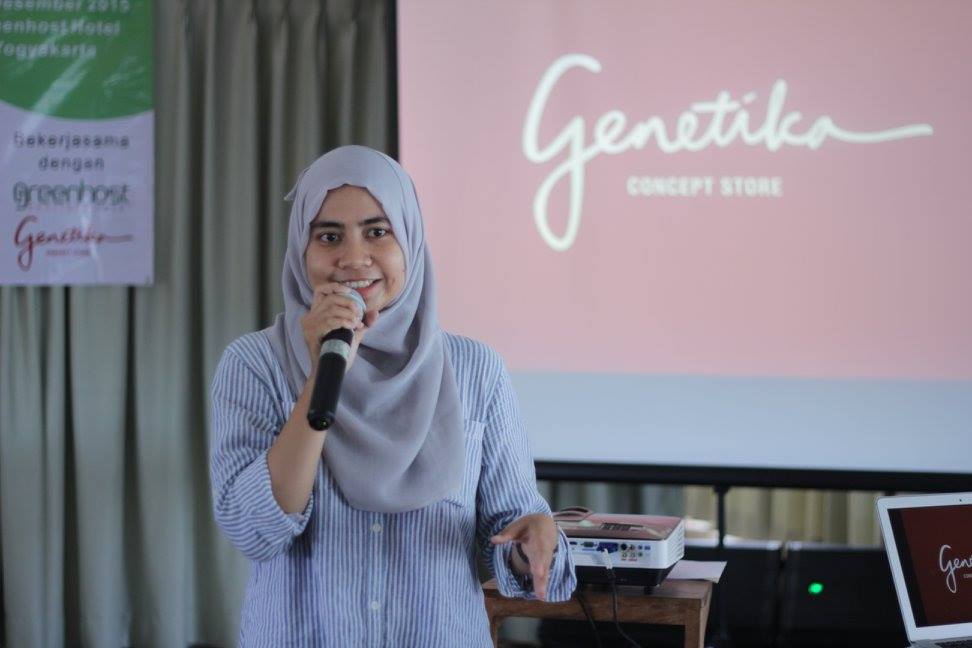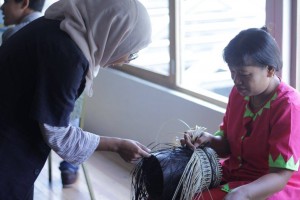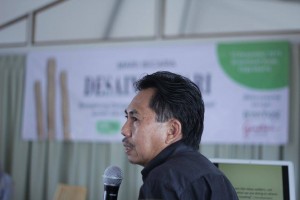YOGYAKARTA, Indonesia – Water was streaming up to the roof of the hotel to water the vegetable garden. Amazing! It was the first time ever I witnessed something like that. Apparently, in the GreenHost Hotel in Yogyakarta, dishwashing water is filtered so that it is clean and can be used for watering the growing vegetables on the roof! This was the perfect setting for the sustainable design seminar to be held on the same floor of the amazing roof top garden!
We were 50 people gathered around the room first listening to the inspirational messages provided by the renowned architect, Eko Prawoto, a professor at the Duta Wacana Christian University (UKDW) and a sustainable design advocate working with bamboo as one of his main materials in design. He emphasized the use of local materials, local knowledge and skills to design structures that were still in tune with their surroundings.
We then heard from Dyah Soemarno of the company Noorside who shared with us their original sustainable lighting design with LED lamps, and finally from Anisa Dilla Qolbi of the Genetika Concept Store/ GreenHost Hotel sharing with us their experience of supporting local artisans to learn new skills, exchange knowledge and provide a venue to sell their local craft and art.
In the afternoon we heard from Ibu Esah, a Dayak rattan weaver who was recently participating in the ROLES or Sustainable Rattan project of NTFP-EP, applying the Participatory Guarantee System (PGS) an alternative form of certification. She shared how she was documenting harvest in their rattan gardens. She shared that with the ROLES project she was able to receive better income from providing evidence that rattan was sustainably managed. A person in the audience questioned the tedious and time consuming process of documentation but Ibu Esah shared frankly that the system was simple. Natasya, NTFP-EP Indonesia Conservation Officer, also shared how more weavers were now saving their rattan gardens through this initiative.
Finally, Miranda of HIVOS shared about the initiative of the Sustainable Hand-woven Eco-Textile (SHWET) initiative supporting thousands of textile weavers in Indonesia and the Philippines to apply safer textiles applications for people and the planet, in support of traditional knowledge and practices.
The discussions afterwards were framed around the question of sustainability and cost. The fundamental question being, “Does sustainability need to be expensive?” The speakers shared that traditional farmers and earlier generations were already “sustainable” without knowing the word for it. “They already farmed without using chemical fertilizers but by using animal manure and other bio-degradable inputs,” said Dyah Soemarno of Noorside. How then do we return to those times by also maximizing the technological gains of today?
To end the seminar, all reflected on the wise words of Architect Eko Prawoto: ”No environmental sustainability is possible without social sustainability. No social sustainability is possible without cultural sustainability.”
Written by Crissy Guerrero, Senior Adviser for Strategic Programmes, crissyg33@yahoo.com






